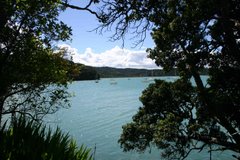
 It's mid-winter in Aotearoa, and the pruning for grape growers is well under way. The two main types of pruning the vines are finding healthy canes with sufficient number of buds and laying them down on the wires for shoots in the spring(left); or leaving spurs with a sufficient number of buds on last years canes as shown in the picture on the right.
It's mid-winter in Aotearoa, and the pruning for grape growers is well under way. The two main types of pruning the vines are finding healthy canes with sufficient number of buds and laying them down on the wires for shoots in the spring(left); or leaving spurs with a sufficient number of buds on last years canes as shown in the picture on the right.Both methods work well, and depend upon variety, terrain, labour and growing styles. The essential purpose being to have new shoots burst through in the spring from last years growth and produce canes healthy enough to flower and fruit. Viticulture experts will have any number of reasons for using either method. In the end, the production of quality fruit will have to start with an appropriate number of buds, and from there, it all begins, as with most plants. Note the heavy under planting of a winter cover crop on the left and lower shots as opposed to the right. This will be due to a simple timing issue effecting the strike rate of the seed put down (the row on the right picture was sown a week later, after the soil temp had dropped), as well as the bird population catching on!
Heavy rain is falling at the moment, and July has had a number of moist warmer low pressure systems dropping copious amounts (100mm+) of rain on several different days. Needless to say, it is pretty soggy out in the fields. We keep all the equipment off until it is dry to avoid further compaction. 100mm= approx 4 inches in N American terms. About what Southern California gets all year!
I thought Auckland might rate as one of the 15 greenest cities on the planet, but not so, according to this poll from online magazine Grist, as reprinted in Alternet. West Coast USA cities Portland, Vancouver and San Francisco came as no surprise, having lived in each of them. But places like Sydney and Bangkok were eye openers for me. See for yourself why the initiatives these cities have taken are putting them at the forefront of urban environments making a difference. Still, Bangkok? I could hardly breathe last time I was there. Apparently recycling residents' cooking oil for biodiesel fuel is a winner. Whatever.
For Jack Kerouac fans, the legendary scroll on which he typed non-stop the book On the Road, is a priceless piece of literary history. The truth, according to this NPR article citing the curator for the famous piece of paper, is that he worked through many drafts over the period of 1947-49, but the actual typing only took about 3 weeks, as he typed 100 words a minute. He thought it wasted too much time replacing sheet after sheet, as his mind raced along, reportedly aided by any number of substances that eventually killed him not long after. Great book nonetheless.
If you have the funny feeling that the gap between rich and poor in whatever measure makes sense is getting wider, this article in the U.K.'s Observer is a real eye opener. Welcome to Richistan, USA, gives some sobering statistics. Just a few lest you are in any doubt about what is happening in the Land of Plenty:
"In 1985 there were just 13 US billionaires. Now there are more than 1,000. In 2005 the US saw 227,000 new millionaires being created. One survey showed that the wealth of all US millionaires was $30 trillion, more than the GDPs of China, Japan, Brazil, Russia and the EU combined".
Pretty cool. Especially if you are one of the 227,000 every year(presumably many from the emerging online industries and dot com booms) - was there a bust? Doesn't sound like it. That is only one year! It is an interesting article about how new economies are building around the super-rich and all the social implications of that (can it be called a sub?) culture. Apparently net worth needs to be in the $100 million region even to be considered part of the club.

Hope they're all happy.
In the end, we all come into this world and depart it with the same amount.
On the health front:
A great article here on the famous Dr Bronner and his soap empire (ever read those labels?)
And of course nothing would be complete without a quick update on the latest research around Soy and all its related products. It would appear the fermented variety (such as tempeh), as noted earlier on this blog, has less of the adverse effects present in normal soy.









